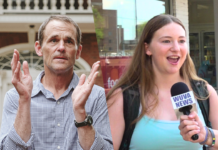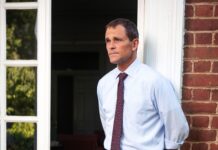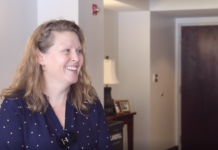Over the past few weeks, as states have begun to reopen their businesses, COVID-19 case numbers have increased. Forty states have seen an increase in daily cases and over 35 states have observed a rise in positive test rates. At this point, the US government has allocated trillions of dollars to various efforts aimed at maintaining the health of the US economy. On June 26th, Peter Debaere, economist at the UVA Darden School of Business, wrote an Op-Ed for the Dallas Morning News detailing the economic effect of reopening the economy. In this paper, he cautioned against a premature reopening of the economy, warning that it might waste all the efforts so far to fight the virus, including the ramped-up government spending.
Q. In your op-ed for The Dallas Morning News, you stated that we were in “the most severe [recession] since the Great Depression.” However, on July 2nd, President Trump claimed that the economy was “roaring back”. You have stated that political rhetoric makes bad economics. Where is the disconnect between these two statements coming from?
A. Sure enough, the employment numbers have improved. According to the latest count, we are now at around 11 percent unemployment or so, which is still a very high number. Remember what we did: Because of the virus we voluntarily put the economy on ice. We shut down nonessential activities and introduced social distancing. In other words, we restricted both the supply and demand sides of the economy. To soften the blow, provide liquidity, and avoid massive insolvencies, the federal government has been spending over $2 trillion on grants, unemployment benefits, and loans, and the Federal Reserve has bought at least $4 trillion in financial assets and lowered the interest rate to virtually zero. The aim was to “flatten the curve.” On the one hand, we wanted to limit cases and keep hospital capacity from getting overwhelmed. At the same time, we wanted to buy ourselves time to contain cases, study the virus, provide essential gear, prepare for contact tracing, and plan for careful reopening.
There is pent-up demand for going to restaurants, shopping, movie theaters, travel, and so on. Once you limit the imposed restrictions, there should be an improvement in economic activity as people buy what was not previously available, and in doing so put others to work. The key question is whether we will be able to sustain this “recovery.” If we open too quickly, and cases explode again (as they have in quite a few places), we may have to shut down again for an extended period. In other words, we would have to start all over, with unemployment numbers rising again. So, as an economist, I worry that if we open too quickly, we squander the significant investment that we have made to contain the cases.
Q. Some states, such as Texas, Arizona, and California, who were some of the first to reopen, are seeing record highs in daily cases. Is this spike, failure to contain and long-term economic consequences what you cited and warned about in your op-ed?
A.While every state has its particular policies and circumstances, I fear that this is indeed what is going on. Keep in mind that the government has made extraordinary amounts of funding available, which increases the overall debt level. The Federal Reserve has brought interest rates down to virtually zero. These measures are most effective if they are applied once, forcefully. If we have to shut down a second time on a relatively large scale, what was initially a liquidity crisis for many companies and organizations may become a solvency crisis. Moreover, it will be harder to muster the political support to issue another stimulus (and there may be less room for it). Also, the Federal Reserve may get to the limit of what it can do, or where it feels comfortable going.
Q. The unemployment benefits created by the CARES act are set to expire on July 31st. How will this impact the millions of Americans currently on unemployment and without health insurance due to COVID-19?
A. At this point, it is too early to evaluate the specific impact of any particular program that was used in response to the pandemic, or to determine if the chosen policy tools were as effective as they could have been or if there were unintended consequences. Careful econometric analysis by economists in the near future will give us this insight. Having said that, it is clear that we needed a measure that provides a safety net and that extends that safety net to people who do not normally have access to it—something like the CARES act. Let’s see where we are in one month. I would assume that some of the benefits of the CARES act will have to be extended beyond July 31st.
Q. Due to this, is a second wave of stimulus checks necessary and what do you think Congress should and will do?
A. As I mentioned, the most effective way to deal with a crisis like this one is to consciously restrict economic activity for a while, and in doing so, contain the virus. This is very costly, but it also buys time. It is like an investment in the health of the population and in the future of the US economy as well. If we do it effectively, the duration of the shutdown will be limited and for many companies and organizations, we are talking about a liquidity crisis, not insolvency. If we have to shut down again (on a large scale, not here and there in a subdivision or a county), we will prolong the crisis (lack of liquidity may turn into insolvency) and most likely we will see less willingness to spend more (issue additional stimulus measures) as debt levels are rising.
Q. What long-term effect will all of the increased government spending have on the economy?
A. At this point, government actions are powerful and essential tools. The provision of unemployment benefits, grants, and loans have supplied the necessary liquidity to shut down, however costly that is. Government spending can also help with the recovery, by rebuilding demand, which generates jobs that, in turn, strengthen demand, and so on. We could target spending toward rebuilding some of our infrastructure. I study the economics of water, and the water infrastructure, for one, has been in terrible shape for a while. We could channel funds toward a green economy with renewable energy, rather than go for oil and gas. A colleague of mine, Mike Lenox, has written a nice piece about this. In a way, increased government spending provides a unique opportunity to shape the future of our economy, if we do so judiciously.
















